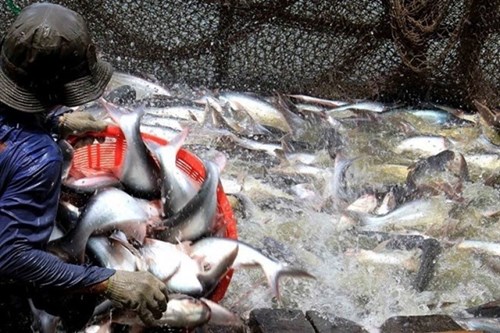    |
 |
Vietnam gained its highest ever seafood export value of USD 8.32 billion in 2017. Photo: vietnambiz.vn
|
The US,
Japan, China and the Republic of Korea
were the top four export markets for Vietnamese seafood products, accounting
for 55.3 percent of the total national export value.
Vietnam’s export markets with strong growth
in seafood export value included China
(up 64.4 percent), the Netherlands
(up 48.6 percent), the UK
(up 36.4 percent), the Republic of Korea (up 29.1 percent), Canada
(up 22.3 percent) and Japan
(up 20 percent).
The Vietnam Association of Seafood
Exporters and Producers (VASEP) said shrimp exports provided the biggest
contribution to the total national seafood export value, with a growth rate of
21 percent to USD 3.8 billion in export value for 2017.
The strong growth in shrimp exports
was mainly due to confidence of export markets for Vietnamese shrimp products,
said Truong Dinh Hoe, VASEP General Secretary.
Other reasons for strong growth in
shrimp exports included an increase of 10 percent in export shrimp price,
higher quality of material and high volume of processed products, Hoe said.
Shrimp export value increased by 60
percent to China, 42 percent
to the US, 33 percent to the
Republic of Korea
and 18 percent to Japan.
Meanwhile, the export value of tra
fish (pangasius) reached nearly USD 1.8 billion in 2017, a year-on-year increase
of 4 percent despite difficulties in many export markets.
Vietnam's tuna export value achieved a
year-on-year increase of 16 percent to USD 600 million while export value of
squid and octopus stood at about USD 600 million, gaining strong growth of 42 percent.
A surprising point regarding Vietnam's seafood exports in 2017 was that China surpassed the US
as the top export market of Vietnam's
tra and shrimp products.
China was the leading export market of
Vietnamese tra fish with a year-on-year surge of 37 percent in 2017 to USD 420
million and the third largest shrimp export market of domestic shrimp
products after the EU and Japan.
Vietnam gained a
year-on-year increase of 60 percent from the export value of shrimp to China
to USD 677 million.
VASEP said that China will continue to be an important market
for local seafood enterprises in the future because Vietnam's
seafood exports to the EU and the US still face anti-dumping tax and
technical barriers.
Seafood exports in 2018 are expected
to reach over USD 8.5 billion, up about 3 percent compared to 2017, though
Vietnam's seafood exports to the US and EU markets will continue to be affected
by catfish inspection, anti-dumping and illegal, unreported and unregulated
fishing (IUU), according to the VASEP.
To achieve this target, Vietnam
must pay attention to antibiotics to ensure quality and competitiveness of
Vietnamese seafood material, Hoe said.
The nation should implement
traceability for seafood export products of Vietnam as per demand of markets importing
Vietnamese products, he said.
Local seafood enterprises should
also focus on applying technology in processing seafood products for export to
increase added value and competitiveness of Vietnamese products, he said.
The export value of agro, forestry
and seafood products reached a record USD 36.37 billion this year, a
year-on-year increase of 13 percent, according to the ministry.
The export of major agricultural
products was estimated at USD 18.96 billion, a year-on-year growth of 15.7
percent while the export value of forestry products in 2017 was estimated at
USD 7.97 billion, an increase of 9.2 percent year-on-year.
Total rice exports for the year
reached 5.89 million tons, earning USD 2.66 billion, a year-on-year surge of
22.4 percent in volume and 23.2 percent in value.
China continued to be the largest buyer
of Vietnamese rice, accounting for 39.5 percent of the total exports.
Rubber, tea, cashew nuts and other
produce also saw high growth in 2017.
In 2017, rubber exports reached 1.39
million tons worth USD 2.26 billion, a year-on-year increase of 11 percent and
35.6 percent, respectively, in volume and value. China,
Malaysia and India
were the three largest rubber buyers.
High prices pushed cashew nut exports
to 353,000 tons worth USD 3.52 billion, a year-on-year increase of 1.9 percent
in volume and 23.8 percent in value. The US,
the Netherlands and China
were top importers.
This year, the export of tea was
estimated at 140,000 tons worth USD 229 million, up 7.2 percent in volume and
5.6 percent in value over last year.
Exports of cassava and cassava
products were estimated at 3.95 million tons in volume and USD 1.04 billion in
value for a year-on-year surge of 6.9 percent and 4.2 percent, respectively.
However, coffee exports decreased
slightly by 20.2 percent in volume to 1.42 million tons and 3.8 percent in
value to USD 3.21 billion. Germany
and the US
were still the top two export markets for Vietnamese coffee.
There was a strong reduction in
pepper exports in 2017 because export prices fell sharply by 35 percent over
the previous year. While pepper export volumes surged by 20.5 percent to
214,000 tons, its value fell 21.9 percent to USD 1.12 billion compared to 2016.
Source: VNA